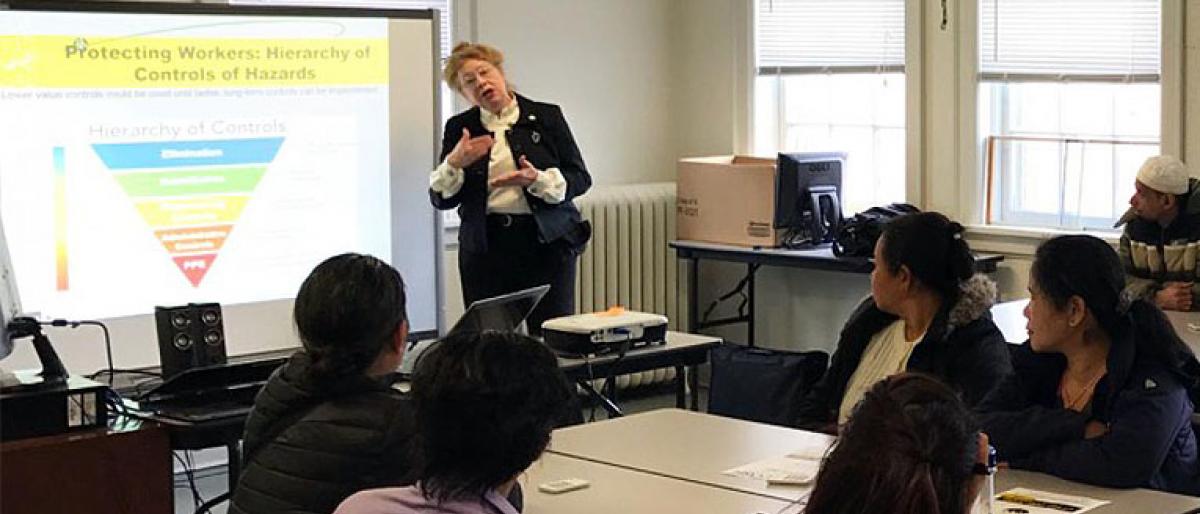Scientific and Technical Expertise Applied to the Work Environment
ILR's Workplace Health and Safety program was established to advance knowledge and heighten responsiveness to workplace issues and environmental concerns. Expert workplace health and safety faculty develop programs focusing on:
- Health and safety issues involving regulatory compliance, worker rights and OSHA
- Technically-based training and technical assistance services
- Public courses, workshops and webinars
- On-site courses and workshops
- Certifications
- Train-the-trainer initiatives
About the Program
The Workplace Health and Safety Program provides training and education on issues of health and safety involving worker rights and OSHA, to assist management, labor, and medical and legal professionals in putting scientific and technical information to practical use in resolving work environment problems.
Virtual and on-site training and technical assistance are available on a wide range of occupational safety and health hazards including chemicals, biological agents (including COVID-19), ergonomics, occupational stress, shift-work and long hours of work, crisis and violence prevention, hazard analysis techniques, and indoor air quality for employers, labor unions, and the public.
Training can be customized to address specific occupational hazards or concerns.
We provide workshops on lead inspection, risk assessment, abatement, renovation and remodeling that define and teach hazard abatement, investigation, and remediation techniques. We offer both initial and refresher training for supervisors, inspectors, risk assessors, and workers, as well as for renovators/remodelers. These workshops are accredited and approved in New York State by the Environmental Protection Agency, Region 2. We also offer generic lead awareness workshops for those desiring an overview of the issues of lead sources, exposure, and hazard reduction.
We teach seven different courses on lead issues, two of which have been approved for credit by Cornell Medical College: Lead Inspector and Lead Risk Assessor, both of which must be taken to earn a total of three credits, and Lead Supervisor/Contractor, itself worth three credits. Successful completion of such a course offered by Cornell-ILR requires a written examination and a passing evaluation of a hands-on skills assessment. Students who expect to work as EPA-certified lead inspectors, risk assessors, or supervisor-contractors, must also pass an exam given by the EPA.
Both credit and non-credit programs in occupational safety and health are offered, or if you have specific needs, we will work with you to design, develop and implement customized sessions to meet your specific education, training, research, and technical assistance needs.
All services are available anywhere in New York State.
To learn more about scheduling this training, contact:
Nellie J. Brown, C.I.H.
Director of Workplace Safety & Health Programs
Cornell University, ILR School
237 Main Street, Suite 1200
Buffalo, NY 14203-2702
Tel: 716-852-4191
E-mail: njb7@cornell.edu
DigitalCollections@ILR Authored by Nellie J. Brown
and “Practical Considerations and Implementation of Anaerobic Digester Systems” Manual and training course. (Co-author) Available at: http://works.bepress.com/nellie_brown/22/
Workplace Health and Safety Virtual Series
Training and Technical Assistance Services on Workplace Safety and Health
We provide programs for all types of workplaces on occupational safety and health, but the following is intended to provide examples of the range of services we offer. One of our strengths is our ability to provide technical assistance and follow-up after our training programs to assist management, labor, and medical and legal professionals in putting scientific and technical information to practical use in resolving work environment problems.
- workplace exposure to chemicals (including our USEPA-certified lead–based paint training programs listed below); green cleaning; toxics use reduction; product substitution; laboratory hazards; art hazards; cannabis/marijuana issues in the workplace
- biological agents (including diseases (including bloodborne pathogens), coronavirus/COVID-19, cytomegalovirus (CMV), allergens, molds and fungi, bedbugs, lice, scabies (and other critters)
- ergonomics; computer ergonomics; noise and hearing conservation; thermal stress
- confined space entry
- occupational stress; wellness
- shift-work and long hours of work
- hazard analysis techniques (vulnerability analysis, accident investigation, process hazard/failure analysis, and job hazard analysis including job hazard analysis for workplace disability issues)
- indoor air quality: sources, solutions, conducting site investigations
- crisis and violence prevention; crisis management and recovery; critical incident stress
- train-the-trainer courses for health and safety instructors
- specialized topics such as: aging workforce, gender and the workplace, young workers, composting, anaerobic digestion (municipal and on-farm)
- health and safety committee training and meeting skills
Workshops are available on specific occupational exposures. Some examples are:
- Water Treatment plant workers
- Wastewater treatment plant and sewer workers
- Cosmetologists/Hairdressers/nail technicians
- Physicians, nurses, dentists, dental hygienists, health care providers
- Firefighters
- Metalworkers and machinists
- Custodial workers
- Painters and decorators
- Teachers (science, art, technology, vocational education such as cosmetology)
- Autobody shop workers
- Maintenance workers (including HVAC)
- Construction workers and roofers
- Operating Engineers
- Office Workers
- Printers and Photographers
- Warehousing and materials handling workers
Technical Assistance
- Site investigations and hazard assessments
- Database searches and literature reviews in the area of occupational hazards
- Information on the adverse effects of chemical and biological hazards for workers' compensation and toxic tort litigation
- Preparation of training materials
- Curriculum development
- Guidance for medical surveillance and periodic screenings
- Assistance in preparation of written hazard control for public and private employers
- Assistance in selection of engineering controls, protective clothing or equipment
- Assistance in product or process substitution to reduce workplace hazards

